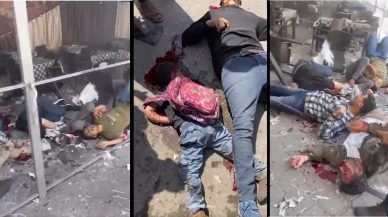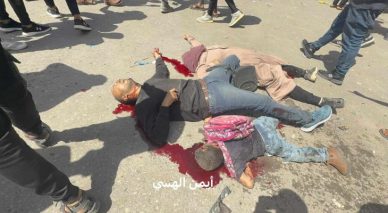GAZA, (PIC)
Since Israel intensified its blockade on Gaza and almost completely closed the border crossings on March 2, 2025, warehouses have become incapable of receiving any new shipments—whether of medicine or medical equipment.
Reports issued by human rights organizations, such as the World Health Organization (WHO) and the United Nations Office for the Coordination of Humanitarian Affairs (OCHA), indicate that over 70% of essential medicines are currently unavailable in the Gaza Strip. Hospitals are also suffering from a severe shortage of fuel needed to operate generators, which has led to the closure of many critical departments, such as intensive care units and operating rooms.
The Ministry of Health has repeatedly warned that the continuation of this blockade signals a total collapse of the healthcare system, especially as the number of injuries increases due to the ongoing genocide. According to official statistics, more than 117,000 Palestinians have been wounded since the beginning of the war, thousands of whom are in critical condition and require urgent medical care that is currently unavailable inside the Strip.
Severe drug shortage in Gaza
Dr. Alaa Helles, Director General of Pharmaceutical Care at the Ministry of Health, says that more than 37% of the essential medicines list is unavailable in the Ministry’s warehouses, in addition to a shortage exceeding 59% in the list of medical consumables needed for all health services.
Speaking to Anadolu Agency, Dr. Helles added, “This shortage directly affects all medical specialties and services, including cancer and blood diseases treatment,” noting that more than 54% of the medications designated for these illnesses are unavailable.
He also pointed out that more than 24% of the medicines needed for dialysis patients are not available, while the Strip is witnessing a 23% shortage in materials required for surgical operations and intensive care.
The Palestinian doctor confirmed that primary care at hospitals and health centers operating in the Gaza Strip lacks nearly 40% of the medicines it needs. The ongoing health and humanitarian deterioration in the Gaza Strip coincides with continued Israeli escalation across various areas of the Strip, causing dozens of deaths and injuries daily.
Dr. Helles said that his ministry “provides detailed reports about the pharmaceutical situation in the Strip to all international agencies operating in Gaza, including WHO, the International Committee of the Red Cross, the Emirates Red Crescent, and other organizations, in an attempt to reduce the shortage.”
The ministry has repeatedly appealed to relevant institutions to provide the needed medications or at least reduce the gap, according to Helles, who warned that if the situation continues as is, the suffering will worsen, “and many patients will face serious complications that could lead to death—amid the pain of illness and the anxiety of families who have no means to save their loved ones.”
Regarding whether there are any other means by the ministry to reduce the risk, the Palestinian doctor mentioned that they are working on alternative treatments in an attempt to deal with the crisis. He added, “This solution is not suitable for all cases,” noting that “changing a patient’s prescribed treatment could endanger their life and directly impact the quality of healthcare.”
Since March 2, Israeli occupation authorities have closed the crossings to the entry of food, relief, medical aid, and goods, causing a significant deterioration in the humanitarian conditions of Palestinians, according to government, human rights, and international reports.
3,000 life-saving trucks
Amid this scene, people with multiple injuries, cancer patients, and those with chronic illnesses like heart disease and kidney failure are among the most affected by the situation, with their lives now threatened due to the depletion of vital medicines and the denial of permission to travel for treatment abroad.
The number of cancer patients alone in the Strip is estimated at about 9,000, most of whom are unable to access any kind of proper medical care, while 15,000 wounded individuals need multiple life-saving surgeries.
These reports affirm that what is happening in the Gaza Strip goes beyond a humanitarian crisis and has reached the level of a systematically managed catastrophe. The use of food and medicine as political bargaining tools represents a clear violation of international humanitarian law, which mandates the protection of medical facilities and the guarantee of aid delivery to civilians during conflict.
Philippe Lazzarini, Commissioner-General of the United Nations Relief and Works Agency for Palestine Refugees (UNRWA), accused the Israeli occupation authorities of using humanitarian aid as a “bargaining chip and weapon of war,” and demanded the lifting of the strict blockade on the Gaza Strip.
In a statement posted on the X platform on Tuesday, he said: “It has been 50 days since the Israeli authorities imposed the siege on Gaza. Hunger is spreading and worsening—it is deliberate and man-made. Gaza has become a land of despair.”
He added, “Two million people—most of them women and children—are being subjected to collective punishment. The wounded, sick, and elderly are deprived of medicine and healthcare.” He pointed out that humanitarian organizations have aid ready for entry into Gaza, including nearly 3,000 life-saving trucks belonging to UNRWA.
Israel has been besieging Gaza for 18 years. About 1.5 million of its approximately 2.4 million Palestinian residents have become homeless after the genocide destroyed their homes. The Strip has entered a phase of famine due to Tel Aviv’s closure of crossings to humanitarian aid.
UN warning
Earlier, the United Nations said that the occupation authorities have been preventing the entry of all types of aid into the Gaza Strip for 50 days, and that the impact of this on the Strip’s population is “extremely serious.”
This was according to UN spokesperson Stéphane Dujarric, during a press conference held last Monday at the UN headquarters in New York.
Dujarric explained that OCHA confirmed that for 50 days, no food, fuel, medicine, or any other essential materials have entered Gaza.
He added that food stocks have dangerously decreased during this period, and that medicines, medical supplies, and vaccines are on the verge of running out. Dujarric pointed out that both children and adults are suffering from hunger, and that the healthcare system in the Strip is on the brink of collapse.
Complete humanitarian collapse
On Wednesday, the Government Media Office in the Gaza Strip warned of the risk of mass deaths at any moment, “due to hunger, lack of healthcare, and the spread of diseases.” The Office warned that “the humanitarian situation in the Strip is entering a stage of total humanitarian collapse, as a result of the systematic policy of siege and starvation imposed by Israeli occupation forces on its population for over six months.”
It confirmed that the Strip “is living through a real humanitarian catastrophe and clear famine, where hunger directly threatens the lives of the civilian population—especially more than 1.1 million children suffering from severe malnutrition, due to the absence of food, scarcity of water, near-total collapse of the health system, and denial of the minimum requirements of life.”
On April 9, UNRWA warned that the Gaza Strip is approaching a state of “extreme hunger” due to the ongoing Israeli blockade and the near depletion of remaining essential supplies. Juliette Touma, Director of Communications at UNRWA, said that infants and children in Gaza “are going to sleep hungry” as the available essential supplies are nearly completely exhausted.
This new stage of famine is occurring at a time when Gaza’s Palestinians have not even recovered from a previous wave of war. Over the past year and a half of genocide, Israel has deliberately limited the entry of aid into the Gaza Strip, depriving hundreds of thousands of poor families of their free food rations.
According to World Bank data, the genocide committed by Israel has turned all Palestinians in Gaza into poor people, meaning they are unable to provide the minimum necessities of life—food and water—for their families.
Since October 7, 2023, Israel—fully supported by the United States—has been committing genocide in Gaza, which has left more than 166,000 Palestinians dead or wounded, most of them children and women, and more than 11,000 missing.















